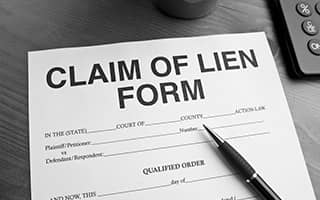Instant Court Case Lookup
The following is for information purposes only
Table of Contents
Liens

A lien is a legal claim or encumbrance on property, real estate, vehicles, or personal assets, used to secure payments of a debt or performance of an obligation. It gives the creditor a legal right to the property until the underlying debt or duty is satisfied.
Liens effectively attach to the asset, restricting the owner's ability to sell, transfer, or refinance until the obligation is resolved. Liens may be voluntary, such as a mortgage, or involuntary, such as a tax lien or judgment lien.
Understanding lien types is essential, as they can impact property ownership, creditworthiness, and financial transactions. Unresolved liens can prevent sales, reduce borrowing capacity, and appear on credit reports, signaling risk to lenders.
Types of Liens in the U.S.
Liens can be categorized based on creation and consent.
1. Voluntary vs. Involuntary Liens
-
Voluntary liens are created with the property owner's consent, typically as part of a financial agreement. The debtor willingly grants a security interest in an asset to obtain credit or financing. Common examples include mortgage liens on real estate or car loan liens on vehicles, where the borrower pledges the property as collateral for the loan.
-
Involuntary liens, by contrast, arise without the owner's agreement. They are typically imposed by operation of law or court order. Examples include tax liens, judgment liens, and mechanic's liens filed by contractors or service providers. These liens remain until they are formally satisfied or released.
2. Common Types of Liens
-
Property Liens: These liens attach to real estate to secure unpaid taxes, including mortgage arrears, unpaid property taxes, or homeowners' association dues. They can restrict property sales until the issue is resolved.
-
Tax Liens: Filed by federal, state, or local governments for unpaid taxes, tax liens take priority over many other claims and may lead to property seizure if unresolved.
-
Mechanic's or Contractor Liens: Contractors, subcontractors, suppliers, or builders may place a lien on property to secure payment for unpaid labor or materials.
-
Judgment Liens: Resulting from a court ruling, a judgment lien allows a creditor to claim a debtor's property to satisfy a legal judgment.
-
UCC Liens: Under the Uniform Commercial Code (UCC), lenders can file liens against a business's assets, including inventory and equipment, to secure commercial loans.
-
Hospital and Medical Liens: Healthcare providers may place liens against insurance settlements or compensation awards to recover unpaid medical bills.
-
Child Support Liens: Enforced through family court orders, these liens ensure that unpaid child support obligations are satisfied, potentially attaching to wages, property, or tax refunds.
How Liens Work
A lien may arise through contracts, statutory authority, or court judgment. Once created, most liens must be recorded with the appropriate government office, such as the county recorder, clerk of court, or state UCC filing system, to provide public notice and establish legal validity. If the debtor fails to pay, the lien can be enforced through foreclosure, garnishment, levy, or other legal collection actions.
The priority order of liens determines which creditors get paid first when the property is sold. Generally, earlier-recorded liens take precedence, though certain liens, such as property or tax liens, may rank higher by law.
Liens can cloud title, meaning they affect the property's marketability and may delay or block a sale or refinancing until they are released. Liens can also have specific durations, depending on state law and the type of lien. Some expire unless renewed, while others remain in effect until the underlying debt is satisfied or legally discharged.
Public Access to Lien Records
Lien records are typically public records and can be accessed through various court databases or state-level filing systems.
What Lien Records Include
A standard lien record typically includes:
-
Debtor and creditor names, which identify who owes the obligation and who holds the claim.
-
Amount owed and filing date, showing the value of the debt and when the lien was recorded.
-
Property description and document or instrument number, especially for real estate or vehicle liens.
-
Release or satisfaction status, indicating whether the lien remains active or has been fully resolved and removed from the title.
Public vs. Sealed Records

Most liens, such as judgment liens, tax liens, mechanic's liens, and UCC filings, are public by law and accessible through county recorders, court clerks, or Secretary of State databases. However, personal identifying information is restricted from the public. Generally, Social Security numbers, bank account information, and sensitive court records are redacted or withheld under privacy regulations.
In some cases, courts may seal lien-related records, especially when they involve juvenile matters, protected health information, or sealed civil or criminal cases. When sealed, these records are not available to the public and can only be accessed by authorized parties.
How to Search for Liens
Searching for lien records requires identifying which authority filed or recorded the lien since liens may exist at the federal, state, or county level. Also, searches may be conducted online or in person, depending on the jurisdiction.
Online Lien Search
-
Federal Liens: Federal tax liens filed by the Internal Revenue Service (IRS) may appear in land records but are also accessible through Treasury or IRS public notice resources.
-
UCC Liens: Business-related liens are searchable through the state's Secretary of State website, such as the California UCC Records and the Illinois UCC Search. These databases typically allow users to search by debtor name, business entity, or filing number and provide access to financing statements and amendments.
-
County-Level Searches: Real estate liens, judgment liens, mechanic's liens, and property tax liens are typically accessible online with the County Recorder of Deeds, Clerk of Court, or Assessor's offices.
-
Third-Party Databases: These services aggregate lien records from multiple public record platforms to provide a comprehensive database. Users may verify all results against official public records to avoid relying on outdated or incomplete information.
Generally, platforms like CourtCaseFinder provide convenient and faster access to lien records from multiple jurisdictions, allowing users to search across different jurisdictions in one place.
Offline Record Search
In-person searches may be required for older records, certified copies, or counties where online access is not possible. Visit the relevant office in your county with the name, property addresses, or document numbers to retrieve the record. Fees may apply for copies or certification.
Mail-in requests are also available for individuals who are unable to appear in person. Mail-in requests typically require submitting the appropriate forms and identification as required.
How to Remove or Release a Lien
A lien can be removed once the underlying debt or judgment has been fully satisfied. The most straightforward method to remove a lien is to pay the balance owed. After payment, the creditor is required to issue a Release of Lien or Satisfaction of Judgment, depending on the type of lien. This release may be recorded with the same office that holds the original lien to clear the record and restore marketable title.
If the lien is disputed or improperly filed, the debtor may negotiate a settlement, request a corrected filing, or challenge the lien's legal basis. When a creditor fails to release a satisfied or invalid lien, the debtor may petition the court for an order to vacate or discharge the lien and have that order recorded to remove the encumbrances.
Impact of Liens
Liens have a significant impact on individuals and businesses as follows:
-
Lien impact on property ownership and real estate transactions: A lien can restrict ownership rights and complicate real estate transactions, as a property with a lien typically cannot be sold or refinanced until the debt is cleared.
-
Lien impact on credit reports and loan eligibility: Certain lien-related debts, such as unpaid taxes or defaulted secured loans, may appear on credit reports or surface during underwriting reviews. As a result, they can make it harder to qualify for mortgages, auto loans, or favorable interest rates.
-
Lien impact on business operations: For businesses, UCC liens may limit the ability to secure additional funding, as lenders are less likely to extend credit when assets are already pledged as collateral.
Frequently Asked Questions
Here are answers to frequently asked questions about liens.
How long do liens stay on record?
Liens remain on the record until they expire under statutory limits, are satisfied and officially released, or are discharged through legal or judicial action.
Can I sell a property with a lien on it?
Yes, you can sell a property with a lien. However, the lien must be resolved, either paid or negotiated, before or during the closing process to ensure a clear title transfer.
Are liens public information in every state?
In most jurisdictions, recorded liens are considered public records, but access methods and privacy protections can vary by state.
How can I dispute or remove a lien?
You can challenge or remove a lien by contacting the creditor or seeking review in court; once the issue is resolved or paid, a formal release must be recorded at the relevant office.
What happens if a lien is not paid?
If a lien is unpaid, the creditor may pursue legal enforcement such as foreclosure, seizure of assets, or wage garnishment, depending on the type of lien.
Can a lien be placed without notice?
Certain liens can be imposed automatically or through court action without the debtor's prior consent. However, the law generally requires that the debtors be notified and allowed to contest the lien.
What is a "silent" lien?
A silent lien is a security interest that is not publicly recorded, making it possible for buyers or lenders to remain unaware of it during routine title searches or asset checks.
Do liens expire automatically, or do they need to be formally released?
Some liens expire after a statutory period, but a formal release is typically required to remove the lien from public records and clear the title.
Can multiple liens be placed on the same property, and who gets paid first?
Yes, multiple liens can be placed on the same property. The payment is generally determined by lien priority, which is usually based on filing order or statute.
What is the difference between a lien, levy, and garnishment?
A lien asserts a legal claim on property, a levy involves the actual seizure of assets, while garnishment directs third parties to withhold funds from wages or accounts.
Can bankruptcy remove or discharge liens?
Bankruptcy may eliminate the underlying debt, but many liens remain unless specifically addressed and removed through the bankruptcy process.
What rights do lienholders have to foreclose or force the sale of property?
Lienholders may have the right to initiate foreclosure to compel the sale of the asset to recover what is owed after the debtor defaults. However, it is subject to statutory procedures and due process requirements.
Are mechanics' liens and contractor liens enforced differently from other liens?
Yes, mechanics' and contractor liens are enforced differently from other types of liens. Typically, these liens follow unique filing deadlines and enforcement rules that differ from general judgment or tax liens.
How does a federal tax lien differ from a state or local lien?
A federal tax lien attaches broadly to a taxpayer's property and is governed by federal priority rules, which may supersede state or local claims.